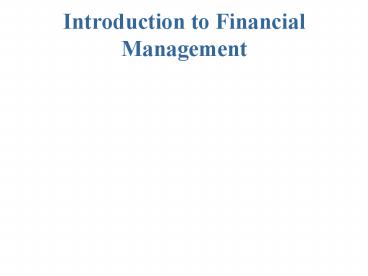Introduction to Financial Management
1 / 13
Title:
Introduction to Financial Management
Description:
What special problems might arise when organizing economic activity across national boundaries ... Religion (e.g., holidays, usury) Work ethic and habits ... – PowerPoint PPT presentation
Number of Views:46
Avg rating:3.0/5.0
Title: Introduction to Financial Management
1
Introduction to Financial Management
2
What is a Multinational Corporation?
- A firm with investment and/or financial
obligations in more than one country - Physical plant and equipment in more than one
country - Customers and receivables in more than one
country - Suppliers and payables in more than one country
3
Why Do MNCs Exist?
- Easy (and true) answer To increase the set of
opportunities available to the firm. - But this is really part of a bigger question
Why form firms at all? - A question to be dealt with more systematically
latter this semester, but the essential answer is
that - a) Economic progress requires organization but
- b) Organization consumes real resources to
overcome certain problems (e.g., communication
and motivation) and thus - c) Firms seem to be a very efficient way of
dealing with these problems
4
What special problems might arise when organizing
economic activity across national boundaries
5
Cultural Differences
- Language
- Religion (e.g., holidays, usury)
- Work ethic and habits
- Attitudes towards men, women and children
- Attitudes towards race and class
6
Political Differences
- Taxation
- Labor, environmental and other regulations
- Enforcement of property rights
- Rules governing importing and exporting
- Contract law
- Rules governing information, accounting and
reporting
7
Economic Differences
- Natural (resources and geography)
- Political-economy (e.g., market economies v
centrally planned) - Currency, banking and finance
8
International finance and corporate finance are
concernced with the same basic things.
- Conventional corporate finance begins with the
assumption that the objective of the firm is to
maximize the value of the firm defined as the
present value of cash flows - ?CFt(1r)-t
- where CFt cash flow at time t and r is the
discount rate
9
Globalization of the World Economy Recent Trends
10
Emergence of globalized financial markets as a
consequence of deregulation and technology
- Financial Innovations, such as
- Currency futures and options
- Multi-currency bonds
- Cross-border stock listings
- International mutual funds
11
Economic Integration
- Over the past 50 years, international trade
increased about twice as fast as world GDP. - There has been a sea change in the attitudes of
many of the worlds governments who have
abandoned mercantilist views and embraced free
trade as the surest route to prosperity for their
citizenry.
12
Trade Liberalization
- The General Agreement on Tariffs and Trade (GATT)
a multilateral agreement among member countries
has reduced many barriers to trade. - The World Trade Organization has the power to
enforce the rules of international trade. - The North American Free Trade Agreement (NAFTA)
calls for phasing out impediments to trade
between Canada, Mexico and the United States over
a 15-year period.
13
Privatization
- The selling off state-run enterprises to
investors is also known as Denationalization. - Often seen in socialist economies in transition
to market economies. - By most estimates this increases the efficiency
of the enterprise. - Often spurs a tremendous increase in cross-border
investment.































